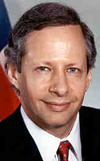Administration Officials Discuss Technology
Related Budget Items
February 4, 2003. Department of Commerce (DOC) officials held a briefing on sections of the President Bush's proposed budget for fiscal year 2004 that pertain to intellectual property, technology, science and innovation. The participants were included Phil Bond, Under Secretary for the Technology Administration (TA), Arden Bement, Director of the National Institute of Standards and Technology (NTIA), Jon Dudas, Deputy Director of the U.S. Patent and Trademark Office (USPTO), Kenneth Juster, Under Secretary for the Bureau of Industry and Security (BIS), and Nancy Victory, Director of the National Telecommunications and Information Administration (NTIA).
 Phil Bond (at right) stated
that "this is a budget that reflects the President's priorities -- technology
is the common denominator". He added that "It is a budget that recognizes money
is limited but research and innovation are vital to America's world leadership."
He stated, for example, that there is a total of $123 Billion for research and
development, which is an increase over this year's proposal and "is more basic
research and development than the rest of the G8 combined."
Phil Bond (at right) stated
that "this is a budget that reflects the President's priorities -- technology
is the common denominator". He added that "It is a budget that recognizes money
is limited but research and innovation are vital to America's world leadership."
He stated, for example, that there is a total of $123 Billion for research and
development, which is an increase over this year's proposal and "is more basic
research and development than the rest of the G8 combined."
Jon Dudas of the USPTO stated that the FY04 budget proposal calls for $1,404 Million, up from the FY03 proposal of $1,334 Million. He also stated that this proposal continues the practice of "fee diversion". However, on the bright side, he said that this proposal "returns to the USPTO a greater share of its revenue than last year". That is, it would decrease from $193 Million to $100 Million under the President's proposals. He also said that this is a "dramatic reduction", and that the administration wants to work with the Congress towards a goal of ultimate elimination of fee diversion.
Dudas also said that the budget proposal would enable the USPTO to move forward in implementing its 21st Century Strategic Plan, which calls for hiring new patent examiners, initiating competitive outsourcing patent searches, and electronic processing of applications, among other things.
Nancy Victory stated that the proposed budget of $21.4 Million for the NTIA would fund "spectrum management reform efforts", a "paperless spectrum management process", and studies of "interference determination methodologies".
However, she said, "new grants are going to be suspended". The NTIA budget proposal contains $2.54 Million for monitoring existing grants, but would eliminate new Technology Opportunity Program (TOP) grants. She added that the budget proposal for the Corporation for Public Broadcasting contains $80 Million for grants.
 Kenneth Juster (at right) stated that the proposed
budget increase for the Bureau of Industry
and Security (BIS), which is still also known as the Bureau of Export Administration (BXA),
would enable it to create a new Office of Technology Evaluation. It would also include
an increase of $1.3 Million for enforcement activities, including more staff for its
Special Computer Evidence Recovery (SCERS) program, which pertains to evidence seized from
computers and other electronic storage media.
Kenneth Juster (at right) stated that the proposed
budget increase for the Bureau of Industry
and Security (BIS), which is still also known as the Bureau of Export Administration (BXA),
would enable it to create a new Office of Technology Evaluation. It would also include
an increase of $1.3 Million for enforcement activities, including more staff for its
Special Computer Evidence Recovery (SCERS) program, which pertains to evidence seized from
computers and other electronic storage media.
See also, summary titled "FY 2004 Technology Administration Budget Request Highlights", NIST release, and USPTO release.
Rep. Sherwood Boehlert (R-NY), Chairman of the House Science Committee, stated in a release that "The Administration's budget proposal for science and technology is disappointing, although perhaps unsurprising given the budgetary constraints. On the positive side, the Administration has acknowledged the importance of funding for basic research, particularly in the physical sciences, and the Administration has recommended generous percentage increases in such areas as the National Science Foundation and the National Nanotechnology Initiative. The budget also, as had previously been announced, funds important new research to lay the groundwork for a hydrogen economy."
Rep. Boehlert added that "On the other hand, many science programs do not even keep up
with inflation. In many areas, particularly Homeland Security and cybersecurity,
there aren't enough details yet to fully understand the proposals. Perhaps the
best that can be said is that this budget document may have to be rethought in
any event once Congress finally provides domestic appropriations for fiscal
2003. Certainly, the NASA budget must be rethought in light of Saturday's
tragedy. I look forward to working with the Administration, as I have in the
past, to boost the funding for science beyond the initial proposals."